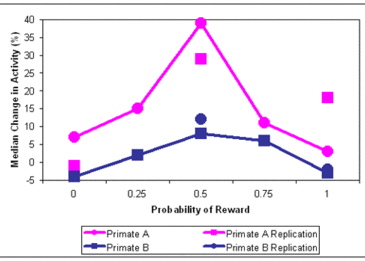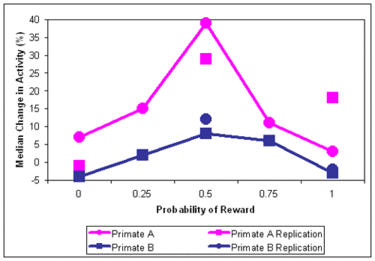Research indicates that the dopaminergic reward system is one of the key mechanisms in learning and reinforcement of adaptive behaviors. Upon receipt of a reward, dopamine is released in the brain, which leads to pleasurable feelings and reinforces behavior. However, dopamine also reinforces maladaptive behaviors, such as substance-induced and behavioral addictions (Reuter, Raedler, & Rose, 2005; Zack & Poulos, 2007). In this edition of the WAGER, we review research by Fiorillo, Tobler & Schultz (2003) that examines the role of dopamine in uncertain situations.
Fiorillo and colleagues presented 2 primates with visual stimuli associated with a 0%, 25%, 50%, 75%, or 100% chance of receiving a reward (liquid) and recorded the activity of these primates’ midbrain dopamine neurons. Once the primates had learned the associations, the dopamine neurons showed increased activity between the stimuli presentation and the delivery of reward for stimuli predicting uncertainty of reward (25%, 50%, 75%). Activation was highest for stimuli predicting a 50% probability of reward (i.e., the highest uncertainty). See Figure 1.
Figure 1. Dopaminergic Activity in Response to Uncertain Stimuli in Two Primates (reproduced from Fiorillo et al., 2003, Figure 3c).
There are some limitations to this study. The reward system in primates might differ from humans’ in important ways. The study also used a very simple conditioning paradigm, whereas a real gambling situation is much more complex.
This increased dopaminergic activation under uncertainty appears to direct attention to the predictive stimulus to facilitate learning. The anticipatory activity might also reinforce risk taking in uncertain situations. Though potentially adaptive, this increased activation under uncertainty also might reinforce maladaptive behaviors such as excessive gambling in some people (Fiorillo, 2004). Most games rely on chance, so gamblers constantly face uncertain situations. Disordered gamblers might be particularly sensitive to the sustained anticipatory dopamine activation produced by these uncertain situations, making them feel good and continue to gamble regardless of whether they win or lose. Future research needs to look directly at this group.
What do you think? Comments can be addressed to Line Gebauer.
References
Fiorillo, C. D. (2004). The uncertain nature of dopamine. Molecular Psychiatry, 9(2), 122-123.
Fiorillo, C. D., Tobler, P. N., & Schultz, W. (2003). Discrete coding of reward probability and uncertainty by dopamine neurons. Science, 299(5614), 1898-1902.
Reuter, J., Raedler, T., & Rose, M. (2005). Pathological gambling is linked to reduced activation of the mesolimbic reward system. Nature Neuroscience, 8(2), 147-148.
Zack, M., & Poulos, C. X. (2007). A D2 antagonist enhances the rewarding and priming effects of a gambling episode in pathological gamblers. Neuropsychopharmacology, 32(8), 1678-1686.





